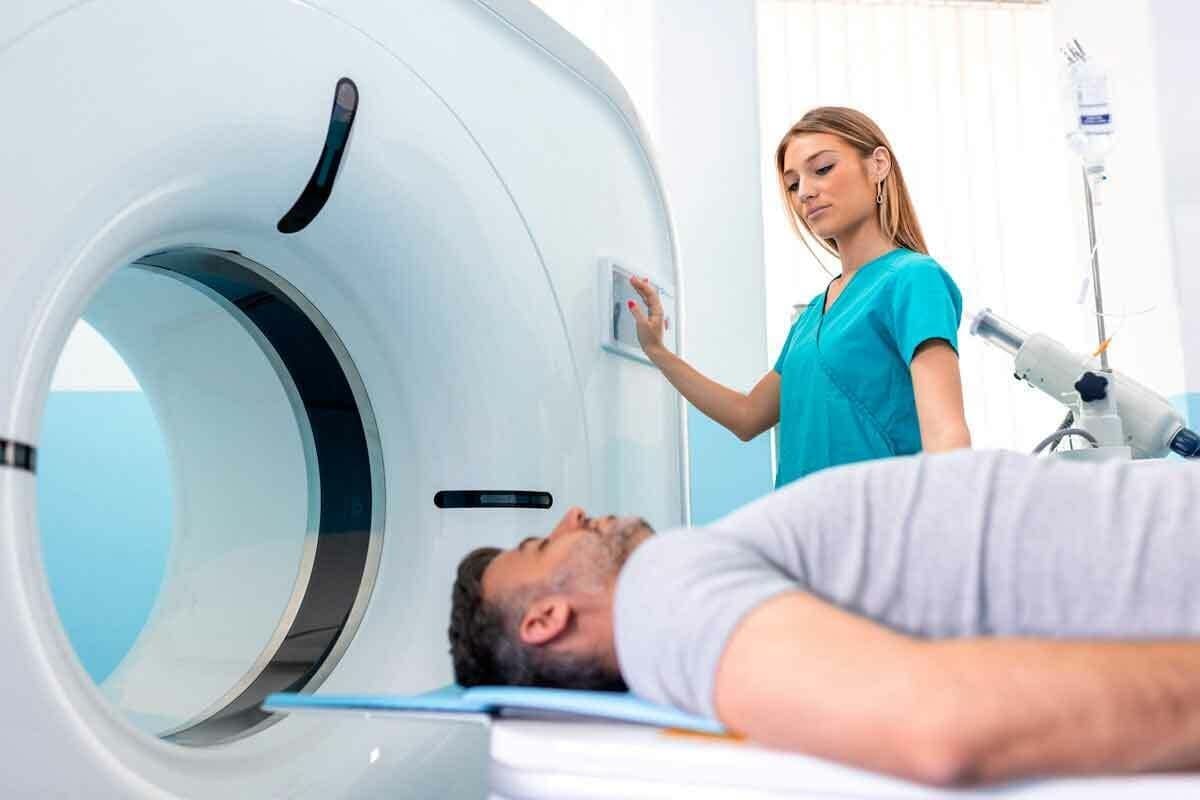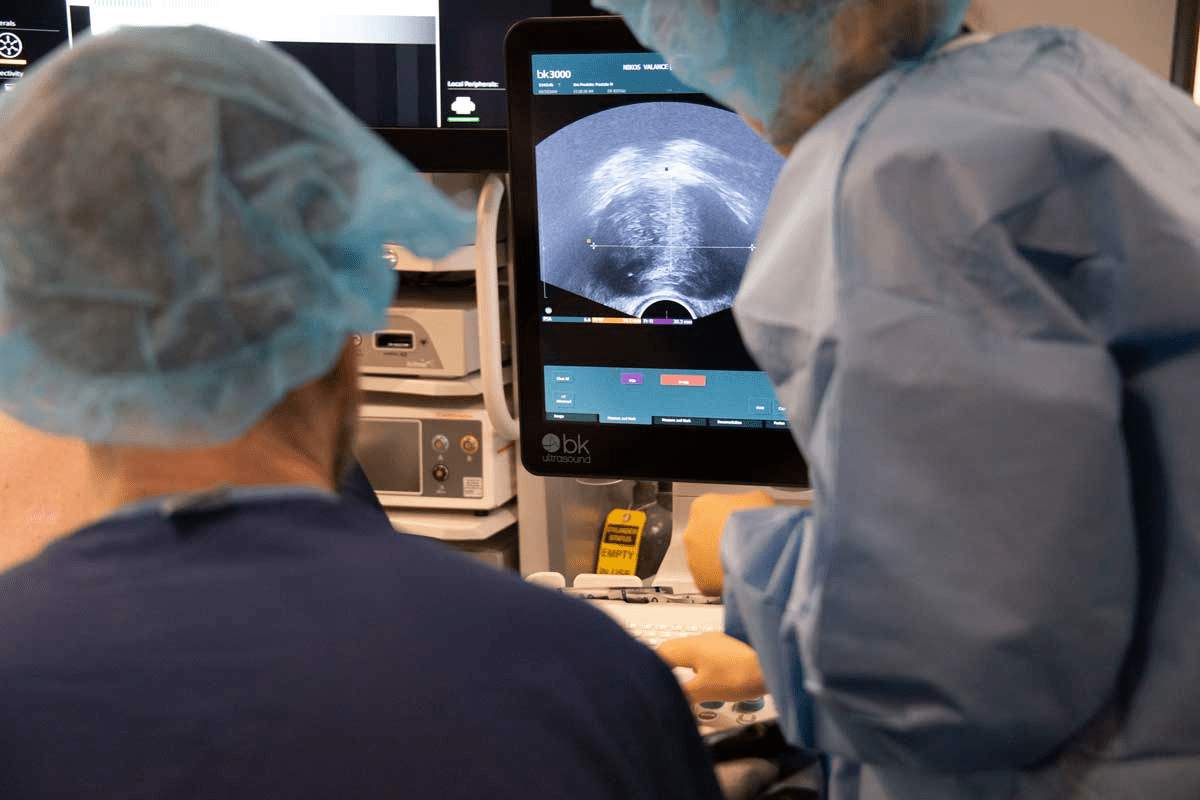Last Updated on November 27, 2025 by Bilal Hasdemir
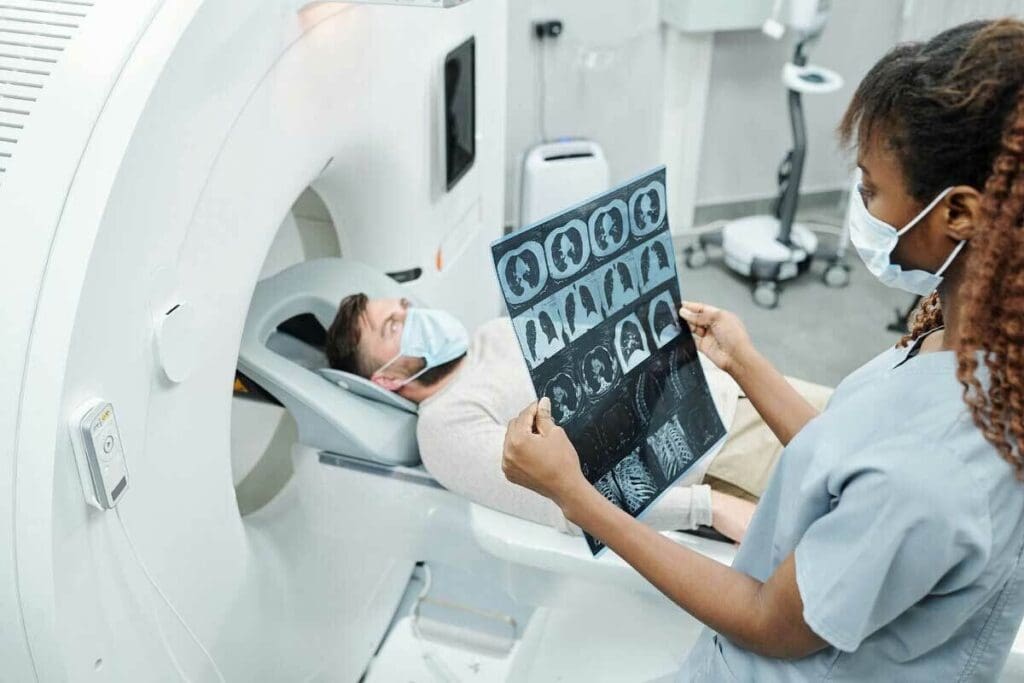
At Liv Hospital, we know that getting a CT scan can make you nervous. Many patients ask, “how long do CT scans take?” The time it takes for a CT scan depends on what’s being scanned and if dye is needed. We aim for top-notch medical care and a great patient experience.
The actual scanning time is usually quick. But getting ready and learning what to do after the scan takes longer. Most visits are fast, lasting 15 to 30 minutes for basic scans.
We focus on making sure the scan is accurate and safe. We also care about your comfort and experience. Knowing how long a CT scan takes helps you plan your day and set the right expectations.
Key Takeaways
- CT scan duration varies based on the area being imaged and the need for contrast dye.
- Standard CT scans typically take between 15 to 30 minutes.
- More detailed scans, like whole body CT scans, can take up to 45 minutes.
- Getting ready and learning what to do after the scan are part of the total time.
- Liv Hospital puts your comfort and experience first, along with accuracy and safety.
Understanding CT Scan Basics
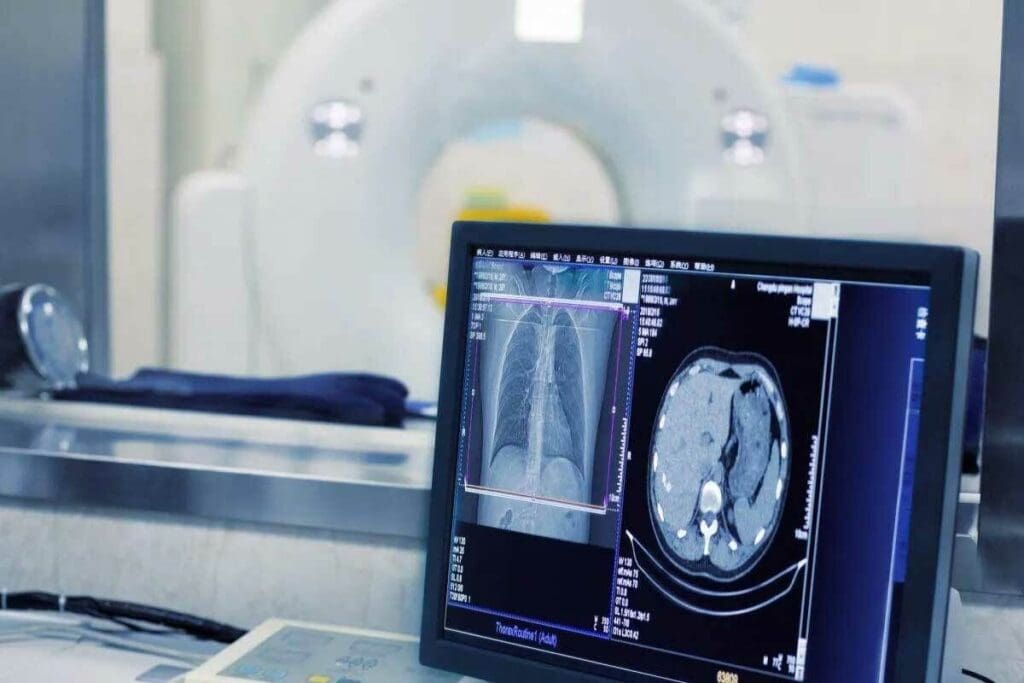
CT scans have changed how we diagnose diseases. Knowing how they work helps patients know what to expect. They create detailed images of the body’s inside, helping doctors find many health problems.
What is a CT Scan?
A CT (Computed Tomography) scan is a safe test that shows what’s inside your body. It uses X-rays to make detailed pictures of organs, bones, and tissues. This helps doctors make more accurate diagnoses.
Key aspects of CT scans include:
- Utilization of X-ray technology to capture multiple images
- Cross-sectional imaging of the body’s internal structures
- Ability to diagnose a wide range of medical conditions, from injuries to cancers
Common Reasons for CT Imaging
CT scans are used for many health issues. They help diagnose and track different conditions. Here are some common uses:
- Diagnosing injuries, such as internal bleeding or fractures
- Detecting cancers and monitoring their progression
- Examining vascular diseases, such as aneurysms or blockages
- Guiding interventional procedures, like biopsies or tumor treatments
Doctors say CT scans are key in modern medicine. They offer fast and accurate diagnoses.
Benefits of CT Scanning: Time Efficiency
CT scans are quick, which is a big plus. They can be done fast, which is great in emergencies. Quick diagnosis is often a matter of life and death.
The speed of CT scans can be lifesaving in emergencies. They also help hospitals run more smoothly. This means patients don’t have to wait as long for care.
How Long Do CT Scans Take: Standard Duration
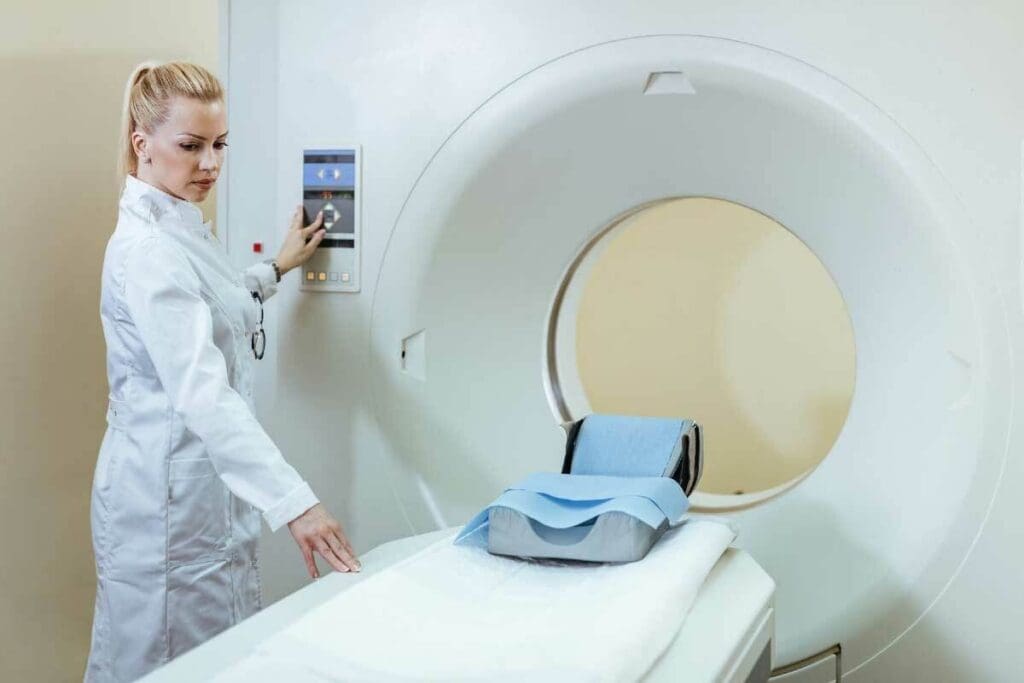
Knowing how long a CT scan takes is ktofor planning your day. Time is precious, and knowing what to expect can ease anxiety. It makes the whole process smoother.
Average Scanning Time
Most CT scans take 10 to 20 minutes to complete. The exact time can change based on the technology and scan complexity. But CT scans are generally quicker than other imaging methods.
Total Appointment Duration
The scan itself might take 10 to 20 minutes. But the whole visit can last 15 to 30 minutes. This includes getting ready, changing into a gown, and getting instructions after.
CT Scan Time Length in Emergency Settings
In emergencies, CT scans are even more critical. Their quick time helps doctors quickly diagnose and treat serious conditions. Every minute is important, and fast imaging can greatly improve patient care.
CT Scan Duration by Body Region
The time it takes for a CT scan changes based on the body part being scanned. Each area has its own needs, which the scan’s length.
Head CT Scan Time Frame
A head CT scan is usually quick, lasting about 10-15 minutes. It’s key for spotting strokes, head injuries, infections, or tumors. The scan is fast because it only looks at a small area.
Chest CT Scan Duration
Chest CT scans take a bit longer, about 15-20 minutes. They help check lung issues, like infections and tumors. The chest needs more detailed images, so it takes a little longer than the head.
Abdominal and Pelvic CT Scanning Time
Scans of the abdomen and pelvis are more detailed and take longer, 20-30 minutes. They’re important for finding problems in the digestive and urinary systems. The extra time is needed to get clear images of these complex areas.
Extremity CT Scan Length
CT scans of arms and legs are faster, lasting 10-20 minutes. They help diagnose injuries and infections in the limbs. The exact time depends on the area and the condition being checked.
Knowing how long CT scans take for different areas helps patients get ready. While these times are common, actual times can change based on the patient and the imaging center’s rules.
How Long Does a Whole Body CT Scan Take
The time it takes for a whole-body CT scan varies. This depends on the scan protocols and if more than one area is being checked. Knowing these details helps patients get ready for their scan.
Full Body CT Scan Time Frame
A whole body CT scan usually lasts between 30 to 45 minutes. This includes time for setting up the patient, scanning, and any extra steps like using contrast dye.
Key factors influencing the duration include:
- The need for contrast dye
- The specific imaging protocols used
- The patient’s ability to remain motionless during the scan
Multiple Region Imaging Considerations
If more than one area is scanned, the time goes up. Each area might need its own settings, making the scan longer.
Specialized Protocol Duration
Some scans use special protocols that can make them longer. For example, scans focusing on certain areas might take more time.
| Protocol Type | Typical Duration | Additional Considerations |
| Standard Whole Body CT | 30-45 minutes | May include contrast dye |
| Multiple Region Imaging | 45-60 minutes | Requires additional setup and scanning time |
| Specialized Protocol | 60-90 minutes | May involve detailed imaging of specific areas |
Understanding what affects a whole-body CT scan’s time helps patients prepare. It also lets them know what to expect during their visit.
Factors Affecting CT Scan Time Duration
The time it takes for a CT scan can vary. This is because different things can affect it. Knowing these factors helps patients prepare better and manage their time.
Patient-Related Factors
How a patient moves during the scan is key. If they move, it might mean the scan needs to be done again. Patients with shaking or other movements might need special help to stay calm. Also, those who are scared or feel trapped might need more time to relax or a special scanner.
Studies show that how well a patient stays calm is very important. It affects how good the scan is and how long it takes.
“Patient motion remains one of the most significant challenges in CT imaging, affecting both image quality and scan time.”
Technical and Protocol Factors
What kind of CT scanner and the scan’s details also matter. Newer scanners are faster and clearer. The scan’s settings, like how many images and how thick, also play a part. Scans with contrast take longer because of the extra steps needed.
Facility Workflow Efficiency
How well the place runs is also important. This includes the team’s skill, the schedule, and the equipment. A smooth-running place can avoid delays and keep scans on track. Places with good software can make things faster for patients.
Understanding these points helps patients see the effort put into making CT scans safe and comfortable.
The Complete CT Scan Process Timeline
The CT scan process has several steps, from check-in to post-scan observation. Each step is designed for efficiency and safety. Knowing this helps patients understand what to expect during their visit.
Check-in and Registration Time
When you arrive, you’ll check in at the registration desk. This step usually takes about 10 to 15 minutes. You’ll need to provide identification, insurance info, and any medical history.
Our staff is ready to help and answer any questions you might have.
Preparation Time
After check-in, you’ll get ready for the CT scan. You’ll change into a hospital gown and remove any metal objects or jewelry. If needed, you might get contrast dye.
This preparation time is usually 15 to 30 minutes. It depends on the scan’s complexity.
Actual CT Scanning Time
The actual scanning is quick, lasting between 10 to 20 minutes. The scanner uses X-rays to create detailed images. You’ll need to stay very quiet and not move during the scan.
Post-Scan Observation Period
After the scan, you’ll be watched for a bit, if you had contrast dye. This usually takes 15 to 30 minutes. Our medical staff will check for any bad reactions to the dye.
| Process Stage | Typical Duration | Description |
| Check-in and Registration | 10-15 minutes | Providing identification and medical history |
| Preparation | 15-30 minutes | Changing into a gown, removing metal objects, and contrast administration |
| Actual CT Scanning | 10-20 minutes | The scanning process itself |
| Post-Scan Observation | 15-30 minutes | Monitoring for adverse reactions to contrast |
Understanding the CT scan process timeline helps patients prepare better. It makes them know what to expect at each stage. Our team aims to make your experience smooth and efficient.
CT Scan With Contrast: Additional Time Considerations
Patients getting a CT scan with contrast should expect a longer visit. This is because extra steps are needed. The time it takes depends on the contrast type and how the patient reacts to it.
Oral Contrast Administration
Oral contrast is given 1-2 hours before the scan. This time, let the contrast absorb fully. It makes the scan images clearer.
IV Contrast Injection Process
The IV contrast injection is fast, taking just a few minutes. But it’s watched closely to catch any bad reactions.
Waiting Period After Contrast Administration
After contrast, whether oral or IV, a wait is needed. It checks if the contrast works and watches for quick reactions.
Extended Monitoring for Allergic Reactions
Allergic reactions to contrast dye are rare but can happen. So, extra watching after the scan is key. It helps catch and handle any bad effects quickly.
The table below shows the extra time needed for CT scans with contrast:
| Procedure | Additional Time | Notes |
| Oral Contrast Administration | 1-2 hours before scan | Enhances image quality |
| IV Contrast Injection | A few minutes | Requires monitoring |
| Waiting Period After Contrast | Varies | Ensures contrast effectiveness and monitors for reactions |
| Monitoring for Allergic Reactions | Extended period post-scan | Crucial for patient safety |
Preparing for Your CT Scan to Minimize Time
Knowing what to expect and how to prepare can make your CT scan appointment more efficient. We guide you through the necessary steps to ensure a smooth and timely experience.
Before Appointment Day Preparations
Before your CT scan appointment, there are several steps you can take to prepare. Reviewing your appointment letter carefully is key, as it has important details about your scan.
- Check if you need to arrive early to complete any paperwork or preparation.
- Note any dietary restrictions or medication instructions.
- Understand if you need to bring any previous medical images or records.
Day of Scan Requirements
On the day of your scan, arriving prepared can significantly reduce delays. We recommend:
- Arriving at least 15-30 minutes before your scheduled appointment time.
- Having your identification and insurance information readily available.
- Being prepared to provide a list of your current medications.
What to Wear and Bring
Your attire and the items you bring can impact the efficiency of your visit. Comfortable clothing without metal is recommended, as it reduces the need for changing into a hospital gown. You may also be required to remove jewelry, glasses, or other items that could interfere with the scan.
The following can be helpful:
- Any previous CT scans or relevant medical images.
- A list of your medications and dosages.
- A friend or family member for support, if needed.
Medication and Food Restrictions
Depending on the type of CT scan you’re undergoing, there may be specific medication or dietary restrictions. Contrast dye used in some scans may require you to avoid eating or drinking for a certain period beforehand.
It’s essential to follow the instructions provided by your healthcare provider or the imaging facility regarding:
- Any medications you should stop taking before the scan?
- Dietary restrictions, such as fasting or avoiding certain foods.
- Hydration instructions, if applicable.
What to Expect During Your CT Scan Time Frame
Knowing what to expect during your CT scan can make you feel more at ease. It’s important to be informed to feel prepared.
The CT Scanning Room Environment
The CT scanning room is a large, open space. It has a table in the center that slides into the CT scanner. The room also has control systems and monitoring equipment.
Positioning and Movement Instructions
You’ll be positioned on the table, which slides into the scanner. You might need to stay very quiet and hold your breath for clear images.
Communication with Technologists
You’ll talk to the technologists a lot during the scan. They will help you through each step and give you instructions.
Sensations During the Scan
The CT scan is usually painless. You might hear sounds from the scanner. If contrast dye is used, you might feel a pinch or cold.
| Aspect | Description |
| Scanning Room | Large, open space with a CT scanner |
| Positioning | Lie on a table that slides into the scanner |
| Communication | Guided by technologists throughout the scan |
| Sensations | May hear clicking sounds; possible pinch or cold from contrast dye |
After Your CT Scan: Time Until Results
The time after your CT scan is key. It includes recovery, analyzing the images, and sharing the results with you. We know waiting for your results can be stressful. We’re here to help you through it.
Immediate Post-Scan Recovery
Right after your CT scan, you’ll be watched closely, more so if you got contrast dye. This is to check for any quick reactions and make sure you’re okay before you leave. Most people can go back to their usual activities soon after, unless told not to by their doctor.
Results Processing Time
The time it takes to get your CT scan results can change. It depends on how complex the scan was and how busy the radiology team is. Usually, results are ready in a few hours to a couple of days. Ask your doctor about when you can expect your results when you first talk to them.
Follow-up Appointment Scheduling
When your results are ready, you’ll get a call for a follow-up to talk about them. How soon this happens depends on how urgent your case is and when your doctor is free. We aim to book these appointments quickly so you get the care you need fast.
When to Expect Findings
You’ll get your CT scan results at your follow-up appointment. Sometimes, your doctor might call or email you if they need to share urgent news. For more on what to expect, check out our guide on CT scans.
We’re dedicated to making your diagnostic journey smooth and supportive. If you have any questions or worries about your results or what comes next, please contact us.
Conclusion
Knowing how long a CT scan takes and what happens can really help reduce anxiety. At Liv Hospital, we aim to give top-notch care and make sure you’re comfortable and ready for your scan.
The time it takes for a CT scan can change based on a few things. This includes the part of the body being scanned and whether contrast dye is used. Our team works hard to give you the care you need, making the scan process as easy and quick as we can.
Learning what to expect during your CT scan can help you feel more ready. At Liv Hospital, we want to make your CT scan experience simple. We give you all the info and support you need every step of the way.
FAQ
How long does a CT scan typically take?
CT scans usually last between 15 to 30 minutes for basic scans. More detailed scans, like whole body CT scans, can take up to 45 minutes.
What is the average scanning time for a CT scan?
On average, scanning itself takes 10 to 20 minutes.
How long does a whole-body CT scan take?
Whole body CT scans take 30 to 45 minutes because they cover more areas.
Does the use of contrast dye add to the overall duration of the CT scan?
Yes, contrast dye adds time. It can be given orally or through an IV, increasing the total time.
What factors can influence the total duration of a CT scan?
Several things can affect the time spent at the facility. These include the patient’s health, the scan’s complexity, and the facility’s efficiency.
How can I prepare for my CT scan to minimize time spent at the facility?
Arrive early and wear comfy clothes. Follow any specific food, medication, or other instructions given.
What happens during the CT scan process?
Technologists guide you through the process. They make sure you’re comfortable and in the right position. The scan itself is quick, and you’ll know what to expect.
How long does it take to receive the results of a CT scan?
Results time varies. You’ll be told when and how you’ll get them. Follow-up appointments are set as needed.
Are there any specific instructions I need to follow before my CT scan?
Yes, follow any food, medication, or other specific instructions given before your scan.
What should I wear and bring to my CT scan appointment?
Wear comfy clothes and know any specific requirements for your appointment.
How long does a CT scan with contrast take?
CT scans with contrast take longer. This is because of the dye and the wait after it’s given.
What is the duration of a CT scan for different body regions?
Scanning time varies by body region. For example, scans of extremities might be quicker. But scans of complex areas like the abdomen or pelvis take longer.
References
- Schoppe, W. D., Hessel, S. J., & Adams, D. F. (1981). Time requirements in performing body CT studies. Journal of Computer Assisted Tomography, 5(4), 513-515. https://pubmed.ncbi.nlm.nih.gov/6790588/


